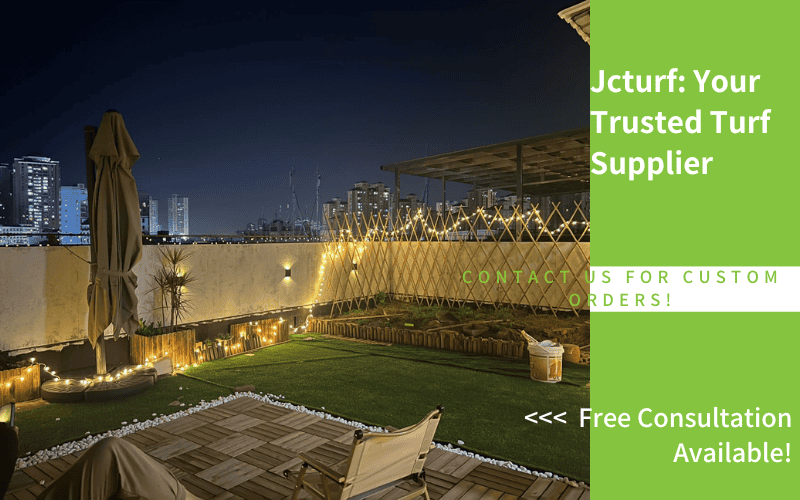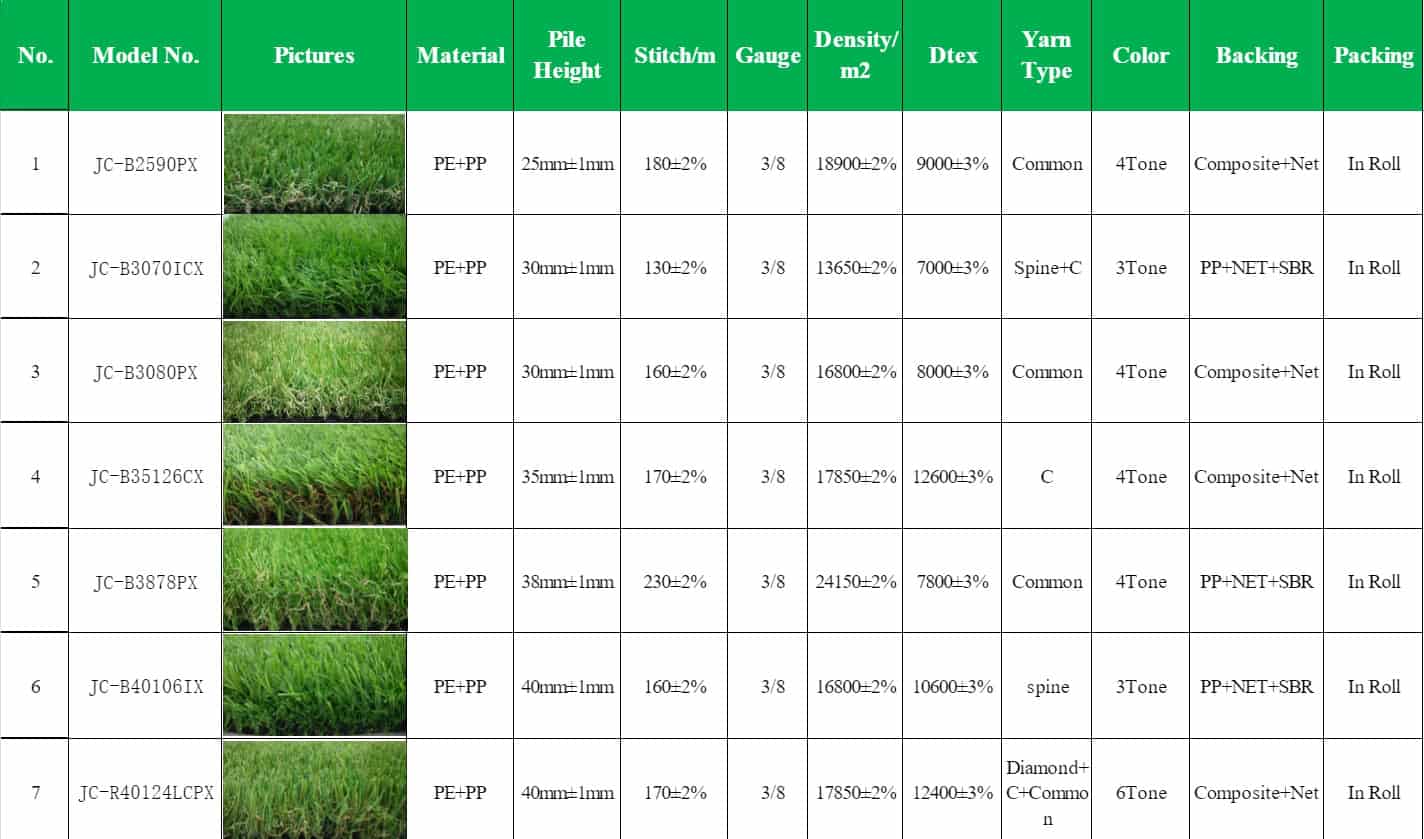Finding the best artificial turf for rooftop use isn’t just about appearance—it’s about performance under rooftop conditions. Your roof has limited load capacity, direct sun exposure, and drainage challenges. That’s why the right turf must be lightweight, UV-resistant, well-drained, and stable—all without sacrificing comfort or style.
This guide starts with four rooftop-ready turf products we recommend, each suited to different needs—whether it’s high durability, soft texture, easy handling, or budget control. Then, we’ll walk you through the key specs to focus on when choosing rooftop turf, like yarn Dtex, pile height, and backing type. You’ll also learn how to match turf types with different rooftop surfaces, avoid common misunderstandings, and follow simple care tips to extend turf life. Finally, we’ll explain why JCTURF stands out—offering engineered turf solutions and custom support for real rooftop demands.
Best Artificial Turf Products for Rooftop Installation
Choosing the best artificial turf for rooftop use isn’t just about looks. Your roof has limited load capacity, weather exposure, and sometimes tricky surfaces. That’s why rooftop turf needs to be lightweight, well-drained, UV-resistant, and stable—while still looking good. Below are four turf options we recommend, each tailored for different rooftop scenarios. Whether you care most about softness, strength, budget, or ease of use, there’s one that fits your needs.
JC-R40124LCPX – For Lush Appearance and Durability
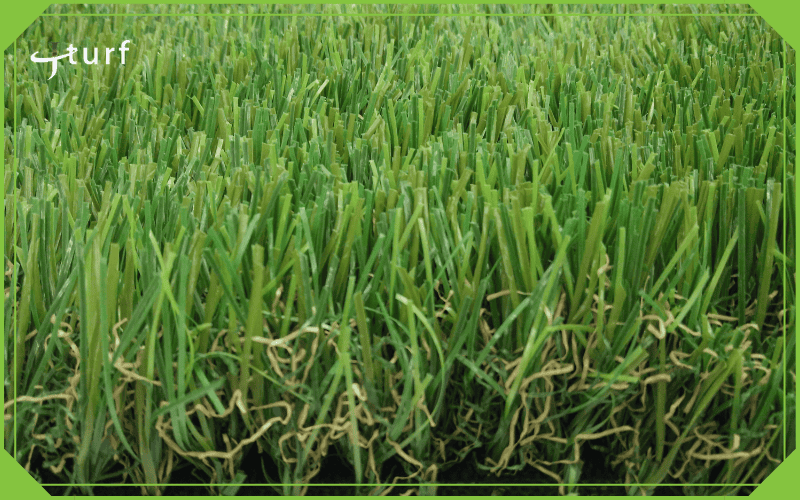
If you want your rooftop to look like a natural lawn—dense, upright, and soft—JC-R40124LCPX is a great fit.
It features a 40mm pile height and a rich 6-tone color mix that mimics real grass. The yarn blends diamond-, C-, and common-shaped fibers to improve spring-back and hold shape over time. With 17850 stitches per square meter and a composite net backing, this turf drains water quickly while staying durable in strong sun or heavy rain. It’s best for rooftop gardens or premium leisure decks.
Compared to others, this one delivers the most lush, natural appearance.
JC-R4282CX – Lightweight and Elegant for Minimalist Rooftops
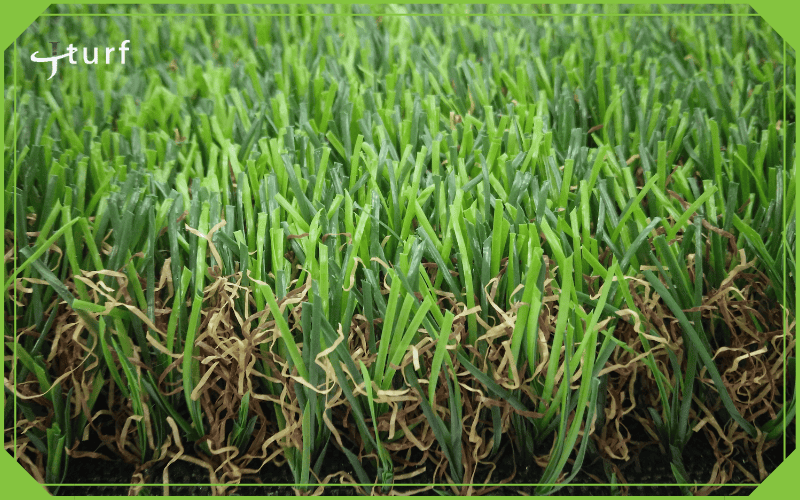
For rooftops with strict weight limits—such as wooden decks or balconies—JC-R4282CX offers a strong balance of lightness and softness.
At 42mm, it’s slightly taller than average but uses lower-density yarn (8200 Dtex, meaning lighter and thinner fibers) to reduce total weight. The C-shaped yarn gives a smooth, cushioned surface, while the composite+net backing ensures proper drainage. The 4-tone color keeps it visually pleasant without standing out too much.
If you’re going for a clean, minimal look and easier installation, this model is a better choice than bulkier options like JC-R40124LCPX.
JC-R4574PX – Practical Choice for Budget Projects
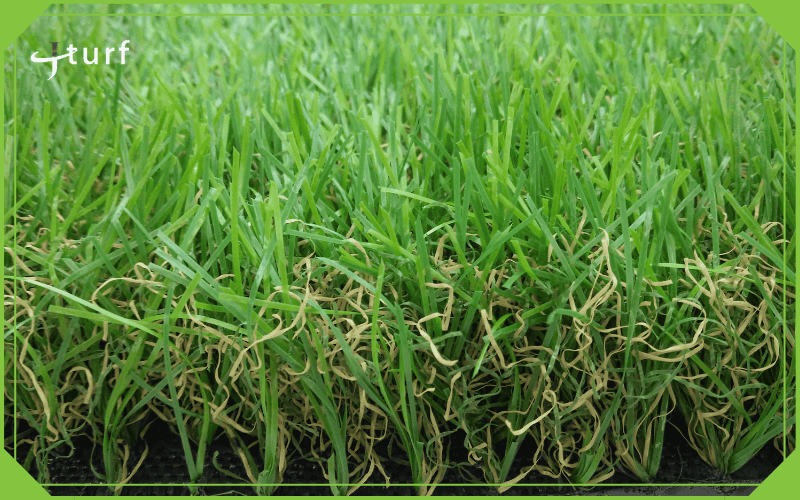
If you’re watching your budget or working on a temporary or low-traffic rooftop, JC-R4574PX gives you just enough of what matters.
With a 45mm pile and a simple common yarn structure, it still offers 4-tone color for a natural look. The 7400 Dtex yarn (less thick and less dense) makes it lighter to transport and easier to lay down. Its PP+NET+SBR triple backing handles basic drainage and keeps the turf in place. It works well for personal balconies, short-term use, or rental properties.
Among all four, this one is the most budget-friendly with a decent appearance.
JC-R45110PX – Reinforced for High-Footfall Rooftops
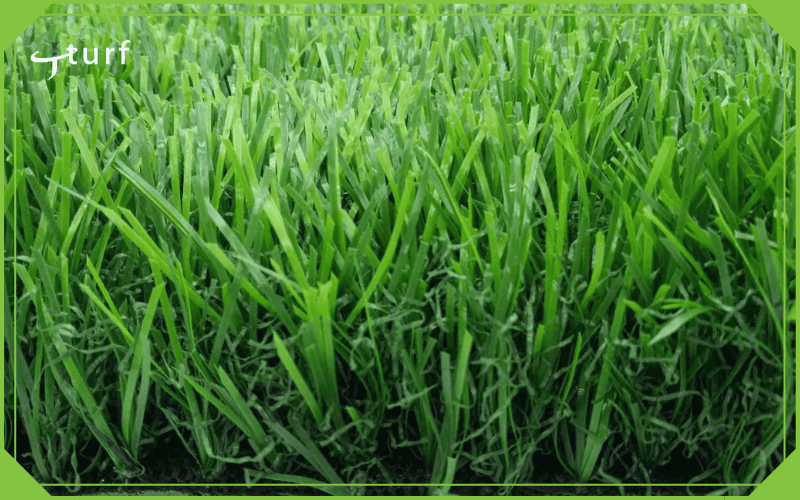
If your rooftop will have frequent use—like a lounge area, rooftop café, or shared space—you’ll need something tougher. JC-R45110PX is built to last. It combines a 45mm pile with a high-strength 11000 Dtex yarn, offering extra wear resistance and resilience. The 16800 stitches/m² give it structure, and the PP+NET+SBR backing keeps it stable during heavy use and sudden weather changes. Its 3-tone finish keeps the surface visually clean and uniform.
Compared to JC-R4574PX, this version handles much more traffic and remains upright longer.
| Product Model | Pile Height | Dtex (Yarn Thickness) | Yarn Shape | Color Tone | Backing | Stitch Density | Best For |
| JC-R40124LCPX | 40mm | 12400 | Diamond + C + Common | 6-tone | Composite + Net | 17850/m² | Lush rooftop gardens or high-end decks |
| JC-R4282CX | 42mm | 8200 | C | 4-tone | Composite + Net | 16800/m² | Lightweight installations on terraces/balconies |
| JC-R4574PX | 45mm | 7400 | Common | 4-tone | PP + NET + SBR | 13650/m² | Budget or temporary rooftop spaces |
| JC-R45110PX | 45mm | 11000 | Common | 3-tone | PP + NET + SBR | 16800/m² | High-traffic rooftops like lounges or cafes |
How to Choose the Best Artificial Grass for Rooftop Use
Choosing the best artificial grass for rooftop use means looking beyond appearance. You’ll need turf that drains well, handles sunlight, doesn’t overload your roof, and stays in place. Here are seven key specs to check—like yarn weight, pile height, UV resistance, and installation ease—so you can make the right call.
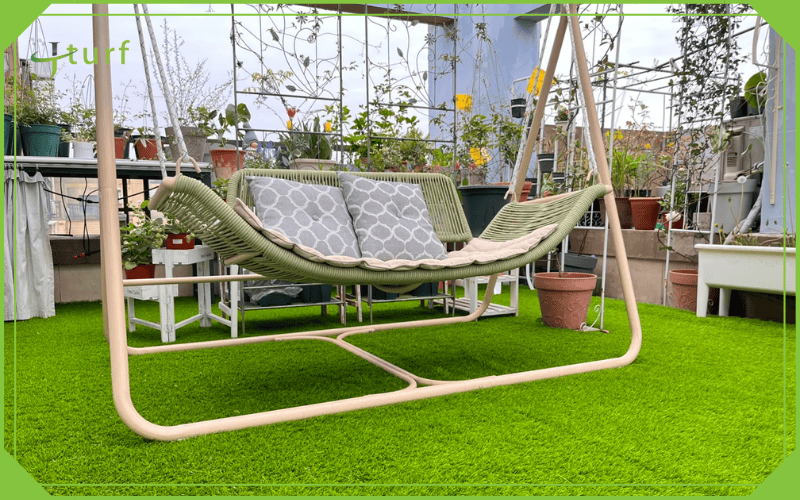
Yarn Dtex (Weight)
Dtex measures how thick and heavy the yarn is. For rooftops, lower Dtex means less strain on the structure. Choose turf in the 7400–11000 Dtex range to balance strength and lightness. Going too heavy risks drainage problems and difficult installation.
Pile Height
Short to medium pile height (30–45mm) is ideal for rooftops. Taller turf looks soft but can trap more heat and water, and adds weight. A 40–45mm pile is usually the sweet spot for both comfort and function.
UV Resistance and Heat Tolerance
Roofs get intense sunlight. Make sure the turf is labeled UV-resistant or uses imported UV-stabilized yarns. Otherwise, it may fade, dry out, or become brittle in a few seasons. Some turfs are also designed to stay cooler in direct sun.
Backing and Drainage
Your roof won’t absorb water—your turf needs to drain it fast. Look for composite or SBR-backed turf with perforations or mesh layers. A well-draining turf helps prevent puddling, mold, and damage to the roof membrane.
Yarn Shape
Yarn shape affects how the grass stands up over time. C-shape, S-shape, or diamond-shaped yarns are stiffer and more resilient than flat ones. If you want turf that stays upright and lasts longer, this is worth checking.
Stitch Density
Higher density makes turf look fuller and last longer, but it also adds weight. For rooftop use, a density of 13000–18000 stitches per square meter offers good visual quality without overloading the surface.
Ease of Installation
If you’re planning a DIY install or working with a small team, choose turf with moderate weight and flexible backing. Stiff or overly thick turf may look nice but can be hard to roll out or cut on smaller rooftops.
| Selection Factor | Why It Matters on Rooftops | Recommended Specification / Tip |
| Yarn Dtex | Lower weight reduces stress on roof structure | 7400–11000 Dtex |
| Pile Height | Affects appearance, weight, and water retention | 30–45mm (ideally 40–45mm) |
| UV Resistance | Prevents fading, brittleness under strong sunlight | Look for UV-stabilized yarn or certified anti-UV labels |
| Backing & Drainage | Ensures quick water release, protects roof membrane | Composite + Net or SBR backing with drainage holes |
| Yarn Shape | Controls turf resilience and uprightness over time | Prefer C, S, or Diamond-shaped yarn |
| Stitch Density | Balances fullness and total turf weight | 13000–18000 stitches/m² |
| Installation Ease | Affects DIY feasibility and handling on small roofs | Moderate weight and flexible backing preferred |
Matching Turf with Different Rooftop Types
Not all rooftops are built the same—and the right turf depends on the surface beneath it. A flat concrete roof drains differently than a wooden deck, a balcony, or even a green roof system. Below, we break down the four most common rooftop types and explain which turf features match each one best.
Flat Concrete Roof
This is the most common rooftop type for turf projects. These surfaces can usually support medium-weight turf, but often lack slope for natural drainage. Choose turf with strong perforated backing and high water permeability. Composite + Net or SBR backings with medium density are ideal. Avoid overly thick or tall turf that could trap water.
Wooden Deck Rooftop
Wood decks are lighter in load capacity and more sensitive to moisture buildup. For these, go with lightweight turf (lower Dtex, ~7400–9000) and shorter pile (35–40mm). Make sure drainage is effective, and if possible, place a breathable underlay between turf and wood to reduce rot risk.
Balcony or Terrace
Balconies and terraces often have limited space and lower structural strength. Use flexible, easy-to-handle turf with a soft surface and clean backing. Shorter pile height improves comfort underfoot. You may also want a model with added UV protection, as balconies get strong sun exposure but limited airflow.
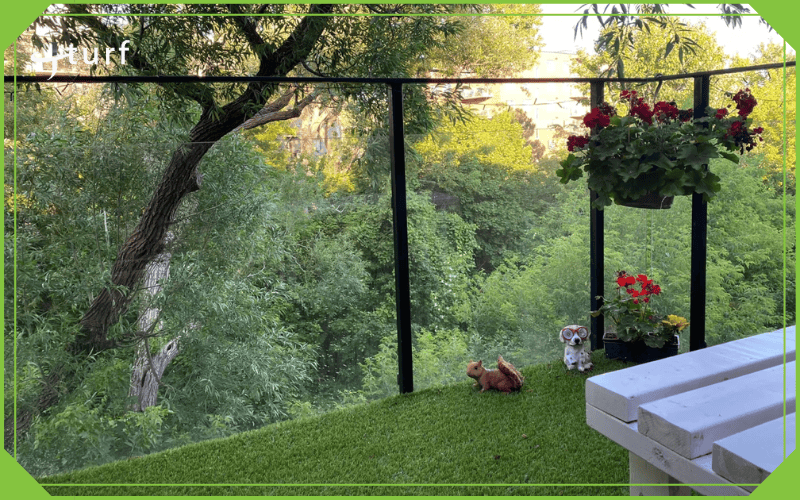
Green Roof System
If you’re working with a green roof (one with waterproofing, insulation, or soil layers), drainage and breathability are key. Look for turf with mesh or open-cell backings. Avoid rubber-filled models—these trap heat and moisture. Choose turf with a realistic look and stable yarn shape to handle seasonal changes.
Common Misunderstandings About Rooftop Turf
There are several myths that stop people from using artificial turf on rooftops—but most of them are outdated or simply wrong. Let’s clear them up:
- “Turf will damage my roof.”
Not true. Rooftop turf doesn’t need to be nailed or glued directly to the surface. With proper drainage and an optional underlay, it protects rather than harms the waterproof layer. - “You must add rubber infill.”
Only sports turf needs that. Rooftop turf is often designed to work without infill, which keeps it lighter and cooler. - “Turf is too heavy for a roof.”
Some are, but rooftop turf uses thinner yarn and backing to stay within safe load limits. Just check your structure if you’re unsure. - “It fades or melts in sunlight.”
Not with modern turf. UV-resistant yarn and heat-stable materials are standard in rooftop models today.
Most rooftop turf concerns come from mixing it up with ground-level or sports grass. With the right product, you won’t face these problems.
Easy Maintenance Tips for Rooftop Turf Longevity
Artificial grass on rooftops is designed to be low-maintenance—but a few simple steps can keep it looking fresh and lasting longer. Here are quick care tips any rooftop owner can follow:
- Brush it occasionally. Use a soft broom or brush to lift the blades and keep them from flattening, especially in high-traffic areas.
- Rinse off dust and debris. A quick spray with water every few weeks helps remove leaves, pollen, and general buildup.
- Check drainage after heavy rain. Make sure no puddles are forming, which could mean blocked drains or an uneven base.
- Keep it free from sharp or hot items. Avoid placing grills, fire pits, or sharp furniture legs directly on the turf.
- Clean spills quickly. If drinks, food, or oil spill, rinse with mild soap and water to avoid stains or odors.
With just a little attention, rooftop turf can stay green, clean, and great-looking for years.
Why Jcturf Makes the Best Artificial Turf for Rooftop Use
Jcturf designs turf specifically for rooftop use—not just general landscaping.
We control weight through low-Dtex yarns and perforated composite backings that support drainage while protecting waterproof membranes. Our products are heat-set and pre-shrunk in 70m automatic tunnels to prevent expansion, curling, or surface deformation over time.
Need special specs? We offer flexible customization in pile height, density, and fiber blends—ideal for everything from compact balconies to large rooftop lounges.
Unlike traders or assembly shops, we’re a fully integrated manufacturer. That means faster delivery, consistent quality, and reliable engineering support—especially for complex rooftop structures.
For rooftop projects that demand performance, durability, and low maintenance, Jcturf delivers turf built for real-world rooftop conditions—not guesswork.

